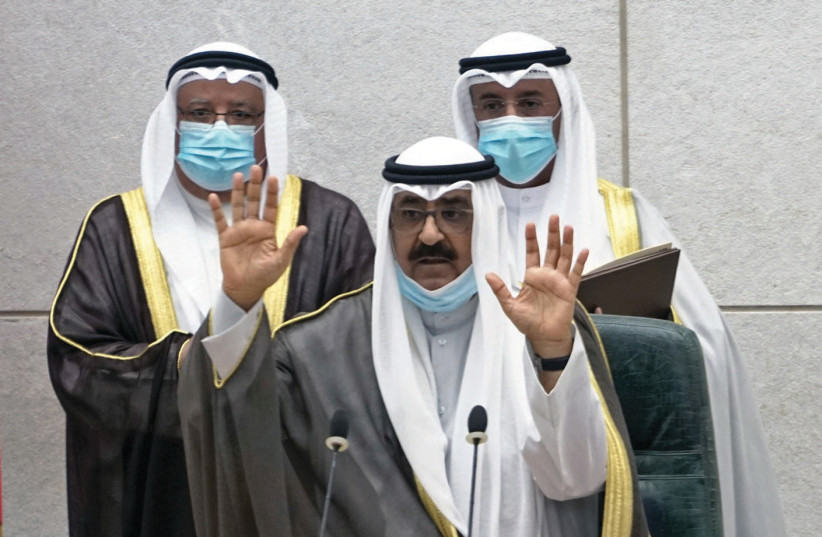The emir of Kuwait, Sheikh Nawaf Al-Ahmad Al-Sabah, dissolved the country’s unicameral National Assembly on Wednesday, paving the way for early elections.
For more stories from The Media Line go to themedialine.org
Sheikh Nawaf, 84, who has delegated the powers of governance to his half-brother, Crown Prince Sheikh Mishaal Al-Ahmad Al-Jaber Al-Sabah, since November due to his travel for medical treatment, said in brief remarks after announcing the move that “the crown prince will give more details.”
“I instructed my brother, the crown prince, to deliver a speech on my behalf, which we hope will clarify everything that is going on. We are fully aware of and follow the political scene,” the emir said.
“I instructed my brother, the crown prince, to deliver a speech on my behalf, which we hope will clarify everything that is going on. We are fully aware of and follow the political scene."
Sheikh Nawaf Al-Ahmad Al-Sabah, emir of Kuwait
The Kuwaiti government submitted its resignation back on April 5, less than four months after its appointment as the fourth government in two-and-a-half years, after the National Assembly voted to “not cooperate” and accused three deputy prime ministers of violating the constitution, disrupting citizens’ interests, and corruption. Since then, the government has assumed a caretaker role.
In his televised speech, Crown Prince Mishaal, 81, identified 10 reasons for dissolving the legislature, the most prominent of which are: increasing differences and conflicts; lack of cooperation between the government and parliament; the presence of personal interests and whims within parliament; and practices and behaviors that threaten national unity.

“We decided, under the will of the people and out of respect for their will, to resort to the constitution, and based on our constitutional right stipulated in Article 107 of the constitution, to dissolve the National Assembly as a constitutional solution and call for general elections in accordance with the constitutional procedures, dates and controls,” he said.
When will the election be held?
The election will be scheduled in the coming months after preparing the “necessary legal arrangements,” the crown prince said.
He called on the people to “make a good choice in the upcoming elections” and “to rally around the political leadership,” announcing the start of a new phase of cooperation and warning of the turbulent conditions and dangers in the region.
The crown prince promised not to interfere in the people’s choice of their representatives, or even to intervene in choosing the speaker of the National Assembly or the various parliamentary committees. He stressed that the Kuwaiti political leadership will stand at the same distance from everyone and will not support one group at the expense of another.
Unlike other countries in the region, Kuwait has an active political life and its parliament, whose members are elected for four-year terms, enjoys broad legislative powers and is often the scene of intense debate. Final authority, however, rests with the emir.
In January, Fitch Ratings downgraded Kuwait to AA- from AA with a stable outlook, citing “ongoing political constraints” that undermine the country’s ability to address structural problems.
All Kuwaiti newspapers praised the crown prince’s speech and the emir’s directives and stressed the emir had acted to “protect the constitution” and to repair the confusing situation.
Arkan al-Enezi, a Kuwaiti journalist, told The Media Line, “The emir’s steps will solve a major crisis that was afflicting the country. The last National Assembly was a major obstacle, during which three governments were formed, all of which were rejected. Such a matter cannot be accepted.”
“Unfortunately, the ministers’ questions were not based on a correct basis. They were either due to personal interests or because of a dispute that has nothing to do with the ministers’ work,” he added.
“It may not be the last time that parliament is dissolved. Unfortunately, those who represent the people repeat the mistakes of their predecessors,” Enezi said.
Hoping for the best
Jaber Hammoud, a Kuwaiti political analyst, told The Media Line that “the steps taken by the emir of Kuwait are 100% legal, and there is no objection from any groups within the people, because the parliament is almost dysfunctional, and the government is only a caretaker government.”
He said that “Parliamentary work since the first day of the speaker’s election was a farce. They questioned the elections, then questioned the legitimacy of the parliament speaker, and attacked the president and ministers, all for the sake of personal interests and accounts.”
“We hope that there will be an election of new faces in parliament. It is about the people, but this may not happen correctly, because sometimes voting is based on the fact that this person is from my tribe or from the category to which I belong or do not belong, and not on the basis of competence,” Hammoud also said.
The prominent Kuwaiti media figure Fajr al-Saeed commented on Twitter, saying: “It’s no use, we are bored.”
The owner and editor-in-chief of the Kuwaiti newspaper Al-Seyassah, Ahmed al-Jarallah, said, “The speeches of the emir of Kuwait and the crown prince left the impression on people that there is an authority, and not as they think, that it is absent or hesitant, or indecisive.”
The National Democratic Alliance liberal bloc said in a statement obtained by The Media Line that “the speech of the emir put an end to the political chaos that Kuwait was suffering from, and the disruption of institutions that took place at a sensitive time during and after the coronavirus pandemic. The people must choose their representatives away from any sectarian or ethnic calculations.”
None of the 50 elected National Assembly representatives objected to the decision of the emir in statements published by the media, as they all agreed on the need to resolve the impasse facing the legislative and executive authorities.
